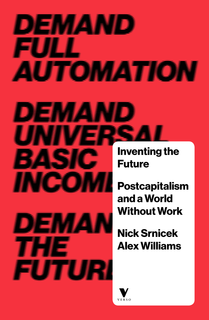Inventing the Future
 1. Demand Full Automation
1. Demand Full Automation
2. Demand Universal Basic Income
3. Demand a shorter work week
4. Destroy the Work Ethic
Believe it or not, this manifesto is nothing to do with New Escapologist. It comes from Nick Srnicek and Alex Williams, the academics behind a new book called Inventing the Future.
They gave a talk at a university building not 300 meters from my Glasgow flat last week so I went along to hear them speak.
I’m glad I went. It was good to see that someone is taking this philosophy seriously and with the establishment force of academia behind them, rather than exhibiting it as an art project or a wry comment somewhere. It feels as though the cartridge is loaded.
The general attitude of Alex and Nick was “what’s all this work for if we’re never getting the freedom it was supposed to buy?” and “why can’t we organise systems that will cater for this?” Sounds familiar, I know, but this is happening inside the machine now, and not just with people like you and me on the ragged fringe.
The book looks good. Here’s the blurb:
Neoliberalism isn’t working. Austerity is forcing millions into poverty and many more into precarious work, while the left remains trapped in stagnant political practices that offer no respite.
Inventing the Future is a bold new manifesto for life after capitalism. Against the confused understanding of our high-tech world by both the right and the left, this book claims that the emancipatory and future-oriented possibilities of our society can be reclaimed. Instead of running from a complex future, Nick Srnicek and Alex Williams demand a postcapitalist economy capable of advancing standards, liberating humanity from work and developing technologies that expand our freedoms.
★ Buy the latest print issue of New Escapologist at the shop; buy our most popular digital bundle; or pre-order the book.




I actually have a sample of this book in my Kindle. Currently reading “Rise of the Robots” which is really a warning about loss of jobs to robots by Martin Ford. I was like and so? Who says we must work 9 to 5? Why not fewer hours? But another book, “Inequality” by the 2015 economics nobel laureate suggested we modify how we use automation to prevent job losses and I was like is this guy for real? Who told him we all want back breaking work that lasts 9 or more hours daily? The above book surely looks like an interesting read and a different take from mainstream opinion. I will read the sample and decide whether it is worthy of my £s. Thanks.
And reading Ford’s book and others, I get the feeling the world is living in denial. There is so much unemployment and the productivity and automation gains of the past decades and an increasingly crowded world probably means there will never be enough jobs to accommodate everybody the way work is currently designed. The French tried a 35 hours work week but that failed probably due to other suffocating French labour laws. It is time for a rethink of how the world works and taxes. Nevertheless, I am not holding my breath for any radical change in the near future.
there are billions of poor people on the planet living in poverty squalor with the guarantee of disease, yet rich middle class academics and the like keep perpetuating this crap. Steve Jobs and his dotcom hippy mates told us we should have a rewarding career. If you want to work 5, 10, 15 hours, nobody is stopping you. Anybody can live on minimum wage working a few hours per week (and top-ups). i live quite happily on a low wage and live simply. It’s not for everyone but then again, i don’t like expensive cities, posh restaurants, cars or 3 bedroom houses.
But wait, what’s your point? You say it’s possible to live well on minimum wage but also that there are billions of poor living in squalor. The idea of automation and UBI is to bring all of those poor squalour dwellers into line with the rest of us, so we can all have a chance of living well on minumum wage.
I agree that good household management/personal financial management is the way forward for individual escapologists who simply want out, but it’s also interesting to think about how a ‘living well on less’ lifestyle could become the baseline for everyone.
Hi Zainab. Yes, I see what you mean. I think the living-in-denial thing is what the authors want to challenge with their ‘destroy the work ethic’ principle. It’s this work ethic that keeps everyone ignoring the reality of post-scarcity. Let me know if you read that sample chapter in your Kindle and how you like it (my copy of the book is in the post so I’ll get to read it soon, but I’m interested in what others think).
Hi Robert. I will let you know what I think of the sample once done with it.
The book looks interesting – I’ve ordered it.
I had high hopes of the credit crunch/austerity ushering in a time-rich/cash poor society based on a “living well on less” philosophy. But naturally that didn’t happen, and neither didn’t happen in the 1970s (peak oil etc.) or 1930’s (depression/Catholic-based land movement). It would be interesting to hear views on why the masses didn’t/couldn’t make that leap. What needs to be ready for the next crisis?
Yeah, I was kinda hoping that would be a silver lining of the global financial crisis too. Surprised we didn’t get more of a “money, who needs it?” discourse going on. My copy of the book arrived yesterday. Not cracked the spine on it yet (metaphorically – I’m a spine integrity maintainer!) but there lot of our favourite words leaped out at me on a quick flip-through. Bon Appetit!